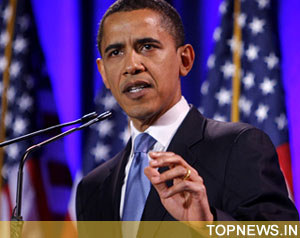Obama offers quick reversal of Bush's global warming policy
 Washington - Two weeks after his November 4 election as the next president of the United States, Barack Obama addressed a conference of US governors on climate change.
Washington - Two weeks after his November 4 election as the next president of the United States, Barack Obama addressed a conference of US governors on climate change.
The president-elect promised a "new chapter" in US leadership. He said the science was "beyond dispute," pledged drastic cuts in greenhouse-gas emissions back home and promised to "engage vigorously" in international negotiations aimed at coming up with a new deal to cut global emissions.
To delegates meeting in Poznan, Poland next month to take stock of international progress, he said: "Your work is vital to the planet."
Obama will not take office until January 20, but his message made US environmental groups positively gleeful after eight years of a president who was viewed as slow to act and often skeptical of the science behind global warming.
"After eight years of federal negligence, the US finally has an opportunity to lead the international fight against the most harmful effects of global warming," said Felicia Marcus, western regional director for the Natural Resources Defence Council.
Besides rhetoric, there are key policy differences between Obama and the outgoing administration of President George W Bush.
Top among them is Obama's push for a federal cap-and-trade system in the United States, which Bush has long opposed.
Such a programme, which already exists in the European Union, would impose mandatory limits on climate-damaging emissions and allow greener firms to trade allowances with more polluting counterparts.
More broadly, Obama has pledged to bring emissions back to 1990 levels by 2020 and reduce them another 80 per cent by 2050, which would bring the US in line with what UN scientists have said is necessary to curb the worst effects of global warming.
As the international community hopes to reach a final climate deal at a Copenhagen summit in late 2009, Obama's ability to convert on his promises at home could make or break the US' bargaining position internationally.
"Clearly some climate change legislation is going to be needed domestically to empower the administration in its international negotiations. And what the contours of that looks like will be really meaningful," said William Antholis, managing director of the Brookings Institution.
Democratic legislators have promised to introduce two of Obama's key priorities as soon as he enters office in January: A 15-billion- dollar annual investment in renewable energy; and new cap-and-trade legislation, which stalled in Congress earlier this year.
With expanded majorities for the Democratic Party in both chambers of Congress and some Republicans also finding a new cause in environmentalism, both bills will likely be viewed favourably.
But Democrats still acknowledge that a cap-and-trade system may not be adopted until 2010, while climate could drop down the list of concerns as the United States aims to steer clear of a protracted economic recession.
Harnessing the economic mood, Obama has made investment in green alternatives one of the key planks of a new fiscal stimulus package he hopes will be approved in January, promising five million new "green jobs" in the process.
Meanwhile, international delegates meeting in Poznan in December will find members of the Bush administration opposite them one last time.
Paula Dobriansky, the State Department's undersecretary for democracy and global affairs and head of the US delegation, promised to "avoid foreclosing options" for the incoming administration.
But even with Obama in power, the international community should not expect a wholesale change in the US' negotiating positions. Obama has insisted that emerging economies like China and India must do their part in reducing global emissions.
Democratic Senator John Kerry, who will lead a congressional delegation to the Poznan talks, left open the idea of trade sanctions for countries that do not agree to global emissions cuts.
At the same time, Kerry acknowledged that US financing for emissions cuts - a key demand from developing countries - may be limited in the short term given the current economic crisis.
Still, environmental groups are convinced that a newly committed US government can only help move the global climate talks forward.
"A very significant message that I will carry to Poznan is that America is back," Kerry said. (dpa)